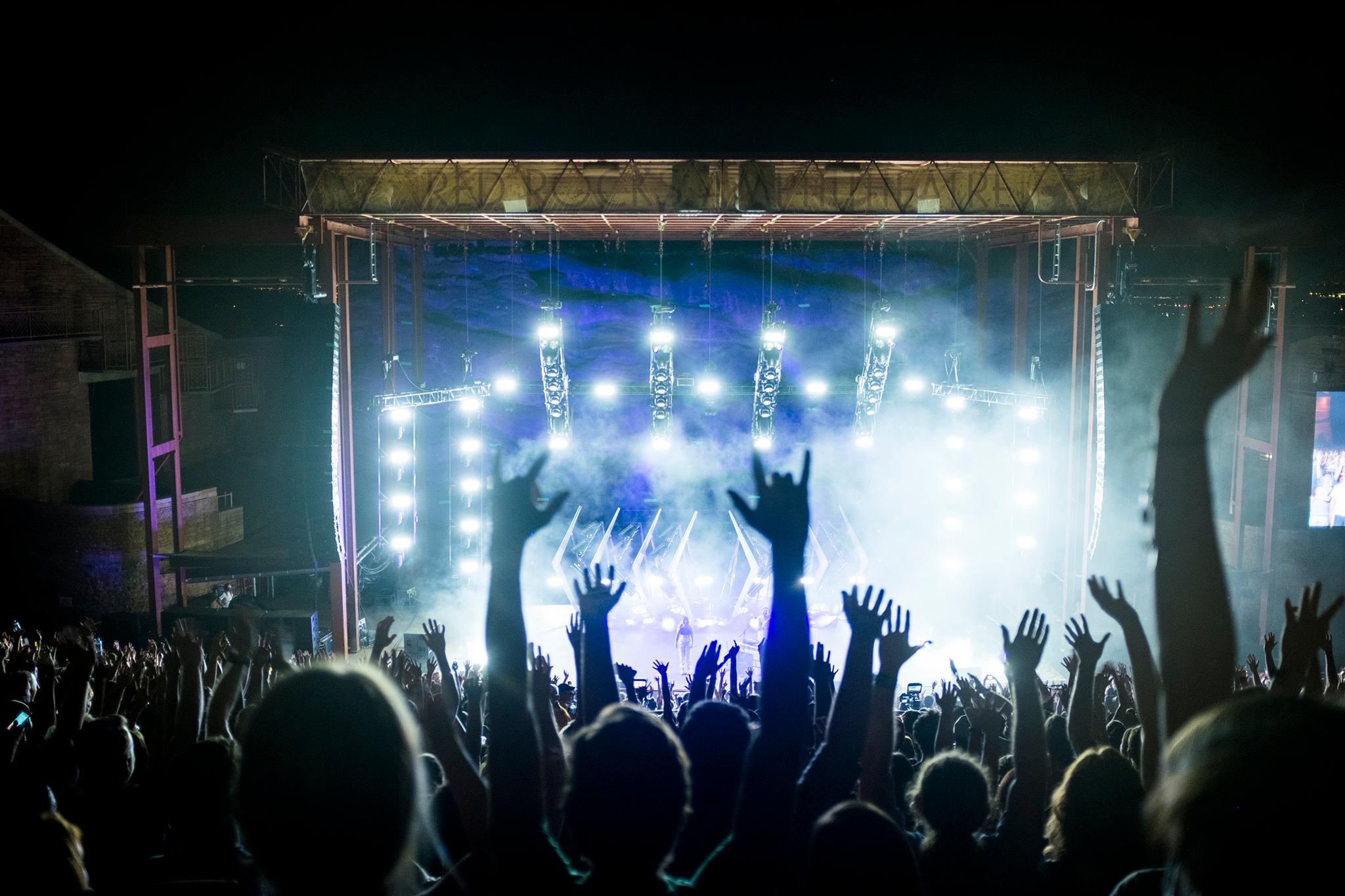Once upon a time, concertgoers could pack elbow-to-elbow into tight spaces, swaying and moving together or pushing and shoving each other to get closer to the stage. Indeed, a key component of the concert experience is its communal nature: the rush or discomfort of being close to so many strangers, each of whom is there to enjoy the same music.
With COVID-19 restrictions loosening, large outdoor venues like Red Rocks and Levitt Pavilion and some indoor ones like the Ogden Theatre are scheduling shows. Earlier this week, Underground Music Showcase announced it is returning with a live, in-person festival in August. After a year mostly devoid of live music, concerts are returning to Denver.
But they are returning changed, with reduced capacity and social distancing requirements that prevent venues from being completely full and keep attendees at a distance. These changes had us wondering: What's it like going to a concert during a pandemic, now that crowds are smaller and people are spaced out?
We asked some of our readers who've been to concerts in the last couple of months what their experience was like, and how they felt about the changes. Here's what they said.
Brett T. said he took his three-year-old son to the 8 o'clock Howl at Red Rocks on April 28.
The event, a music showcase highlighting local performers and first responders who "kept the music playing" during the pandemic, was the amphitheater's first show of the year after closing in 2020. Brett said his son loved to go outside and do the howl at 8 p.m. when it was happening over a year ago to honor frontline workers.
"To be at a Red Rocks show... with my son... his first one ever and my first show of any sort with him... at Red Rocks... well, I'm tearing up again," Brett wrote in an email to Denverite. "The way everybody there -- performers, workers, concert goers -- seemed to feel the same sense of relief, cautiousness, gratitude, and community hit me with all of the feels."
Geoff K. told us he saw Trevor Hall on April 29. It was the first touring show to hit Red Rocks after the amphitheater reopened.
"It was amazing - made me cry tears of joy," Geoff wrote. "Felt very safe. Was about 25% capacity but 100% would have been no problem. Fully outdoors, completely safe. Amazing."
Caroline K. recently saw Float like a Buffalo at Cervantes' Masterpiece Ballroom, an indoor venue.
Every pod had its own table and an area of space blocked off by ropes so that groups could dance in their own pods if they chose. She said the show felt safe, and that it was nice to have the option to sit down if you got tired.
"I REALLY enjoyed this experience," Caroline told us. "It didn't feel normal, but like a new era of shows was emerging, especially for artists that aren't necessarily the 'dancey' type."
Caroline had a similarly positive experience at Red Rocks, where she saw Kaytranada. She said she enjoyed the reduced capacity and increased distance between audience members.
"I think Red Rocks should decrease the amount of people always," Caroline wrote. She liked that she could sit down without risking losing her view of the stage, because no one was directly in front of her. She also liked that she could move and dance freely without feeling like people were on top of her. Overall, she said the concert felt fairly normal, with a couple of exceptions.
"Not knowing if people were vaccinated was difficult to swallow," Caroline said. "People still pass around drinks and joints without any precaution."
Getting an Uber home from Red Rocks is notoriously difficult. Caroline said that this time, it was worse than ever, and that she waited an hour after the show to get home.
"I think this could be an opportunity to visit a better transportation system for post shows," Caroline said.
Matt M. told us he'd also been to shows at Cervantes and Red Rocks, adding that it's "great to be back!"
He said the outdoor shows are less strict than indoor ones, and he loved having the extra space to dance. Still, he said the ticketing process at Red Rocks was frustrating. He said AXS, which runs ticketing at Red Rocks and other venues, has instituted a ticket lottery, which is designed to weed out bots and give buyers a fair chance.
"In the past your availability at the time of sale, internet speed or how many friends you had trying either helped/hurt your chances," Matt wrote. The problem, he said, is that with limited capacity at venues, it can be difficult to access tickets. Groups are buying as many tickets as they can in case their friends get shut out of the lottery drawing.
Matt also said AXS doesn't let you digitally transfer ticket ownership until the week of the event. You're allowed to sell them on AXS's own Marketplace, a feature intended to cap resale prices and prevent price gouging on other platforms, but there's an additional $20 "Buyer Connection" fee.
Matt said he's part of a music community that buys, sells and trades tickets.
"That process has become so much harder now and really punishes the consumer, putting pressure on them to find a buyer the week of, especially if they want to sell at face value (which everyone in the community does) to avoid the AXS Seller fee," he said.
He said the changes might make it harder for concertgoers to make travel plans, because they may have to spend more on AXS's Marketplace or else wait until the week of the event to receive a ticket transfer.
"While I appreciate AXS' intent to prevent scalping, I don't believe they should restrict owners of these tickets from transferring a ticket they technically own," he said. "It's another veiled attempt by a corporate monopoly at 'helping' the consumer, but in reality they are just helping themselves."
Josh A. saw Zhu at Red Rocks a couple of weeks ago and said it was "amazing."
"It was the first time in over a year that things felt normal again," Josh wrote.
He said masks were encouraged, but optional. He also said that even with every other row kept clear, the amphitheater still felt full, which enhanced the vibe of the show.
"I am desperate for normalcy, as most are, and have mixed feelings about the lingering COVID restrictions and masks," Josh wrote. "We are at a point now in this pandemic where everyone has had multiple chances to receive a vaccine. If someone hasn't by now it's likely by choice, and I no longer feel obligated to wear a mask as a symbol of solidarity for those refusing to get vaccinated. We need to fully open up businesses and remove the mask requirements."
He added that the concert was a "huge step" in what felt like the best direction for Denver.













